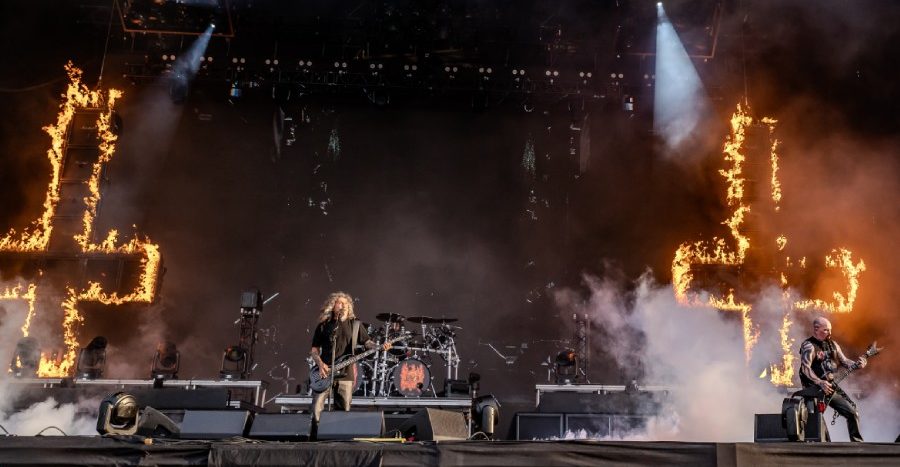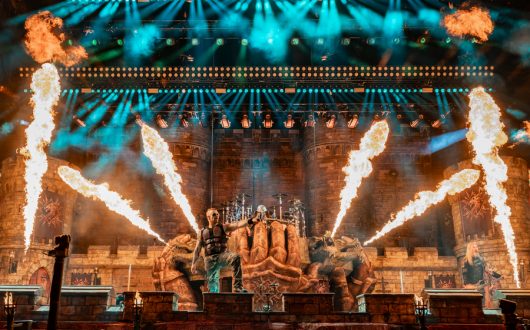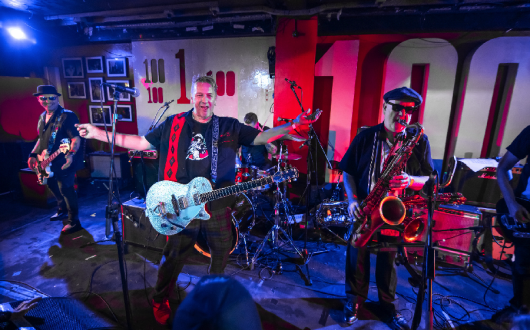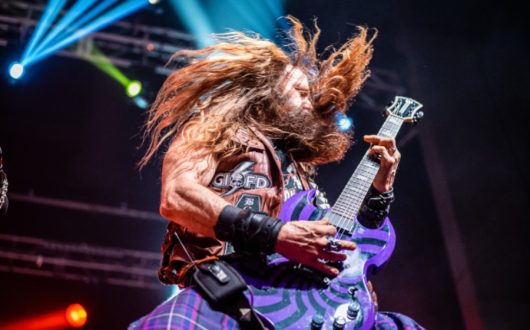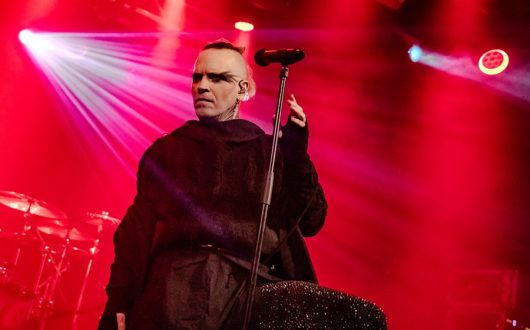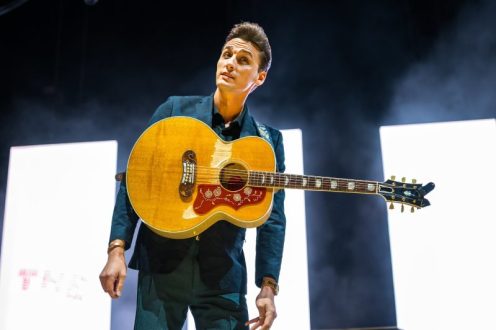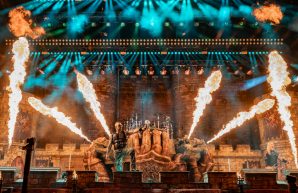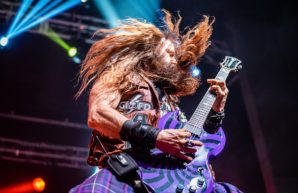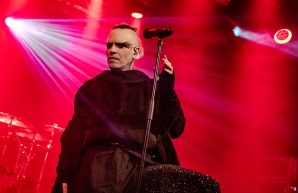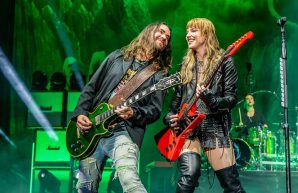Words and Pictures: Adrian Hextall / MindHex Media
London, UK, ‘The’ typical British summer, in its infinite and often cruel wisdom, decided to bless North London with a day of schizophrenic skies. One moment, glorious sunshine bathed Finsbury Park in a golden hue, the next, a sudden downpour sent thousands of black-clad figures scrambling for cover. But the meteorological mayhem did little to dampen the spirits of the 40,000-strong army gathered for a singular, unholy purpose: to witness the return of Slayer.
The very notion of a Slayer show in 2025 feels like a delightful anomaly. After a farewell tour that felt so final, so definitive, their reappearance on the festival circuit was met with a mixture of elation and scepticism. But as the day unfolded, it became clear that this wasn’t just about one band’s victory lap. This was a celebration of heavy metal in all its glorious, multifaceted forms, a testament to its enduring power and its constant evolution.
The day kicked off with a brutal one-two punch from the new school of heavy. Openers Neckbreaker lived up to their name, delivering a set of such ferocious intensity that it felt like the ground itself was shaking. Theirs is a sound forged in the fires of hardcore and death metal, a relentless sonic assault that is both punishing and exhilarating. They are, in no uncertain terms, the real deal, and a stark reminder that the future of heavy music is in very capable, and very loud, hands.
Following them were the veterans of the hardcore scene, Hatebreed. Jamey Jasta and his crew are masters of their craft, and their set was a masterclass in controlled aggression. Every song is an anthem, a call to arms for the disenfranchised and the defiant. The Finsbury Park crowd, a sea of raised fists and screaming faces, responded in kind, turning the field into a swirling vortex of mosh pits and singalongs. It was a powerful display of unity and a potent reminder that, even in a world that often feels fractured and divided, music can still bring us together.
Progressive metal titans Mastodon then arrived to provide a melodic interlude, a moment of complex, intricate beauty amidst the day’s relentless heaviness. Theirs is a sound that defies easy categorization, a swirling vortex of sludge, prog, and psychedelia that is as challenging as it is rewarding. The triple-vocal attack of Troy Sanders, Brent Hinds, and Brann Dailor is now a dual vocal attack since Hinds left the band in March but it is still a wonder to behold, their voices weaving in and out of the complex, labyrinthine arrangements with effortless grace. Songs like ‘Blood and Thunder’ and ‘Megalodon’ are not just headbangers; they are epic journeys, sonic tapestries that transport the listener to other worlds. In the context of the day’s other bands, Mastodon’s set was a welcome and necessary palate cleanser, a reminder that heavy music can be as cerebral as it is visceral.
Sometimes though, cerebral isn’t what you need at a metal festival. True to form, when the party-starting thrash legends Anthrax took to the stage, the atmosphere instantly transformed. If Slayer are the dark, brooding kings of thrash, then Anthrax are its court jesters, its rabble-rousing, beer-swilling, good-time instigators. Scott Ian, a man who seems to have discovered the fountain of eternal youth, stomped and grinned his way through a set of stone-cold classics, his infectious energy spreading through the crowd like wildfire. Joey Belladonna, his voice as clear and powerful as ever, led the charge, his infectious enthusiasm a joy to behold. From the frantic energy of ‘Caught in a Mosh’ to the anthemic stomp of ‘Indians’, their set was a joyous, life-affirming celebration of all that is good and fun about heavy metal.
Just as the party was reaching its peak, the day took another stylistic turn. With the sun casting long shadows across the park, the stage was set for the Viking invasion. Amon Amarth, with their horned helmets and tales of Norse mythology, have become one of the most beloved bands in modern metal, and their performance at Finsbury Park was nothing short of spectacular. This was not just a concert; it was a full-blown theatrical production, essentially a co-headlining spectacle that threatened to upstage the main event. With the expected stage set that resembled a Viking longship, complete with a massive dragon’s head and plumes of fire, the band delivered a set of such epic proportions that it felt like we had been transported back in time. Johan Hegg, a frontman who possesses the charisma and stage presence of a true warrior king, commanded the stage with an iron fist, his guttural roar inciting the crowd to a frenzy. The sight of 40,000 people sitting on the ground, “rowing” in unison during ‘Put Your Back Into the Oar’, was a moment of pure, unadulterated joy, a testament to the band’s ability to connect with their audience on a primal level.
And then, it was time. The stage was bathed in an ominous red light, the air thick with anticipation. The iconic, eagle-shaped pentagram, Slayer’s sigil, was unveiled, and the crowd erupted. For the next 90 minutes, Slayer proceeded to remind everyone in attendance why they are, and always will be, the undisputed kings of thrash metal.
This was not a band going through the motions. This was a band reborn, a band re-energized, a band that seemed to be revelling in the sheer, unadulterated power of their own music. Tom Araya, his voice a venomous snarl, spat out tales of war, death, and damnation with a conviction that was almost terrifying. Kerry King and Gary Holt, a two-headed hydra of guitar-shredding fury, unleashed a torrent of riffs that were as precise as they were punishing. And behind them all, Paul Bostaph, a human metronome of relentless, machine-gun drumming, provided the thunderous, unwavering backbone.
The setlist was a journey through the darkest corners of their back catalogue, a relentless onslaught of classics that left no room for breath. ‘Raining Blood’, ‘Angel of Death’, ‘South of Heaven’, ‘War Ensemble’, each song was a sonic atom bomb, detonated with a ferocity that was almost overwhelming. The pyrotechnics, a constant barrage of flames and explosions, only added to the sense of apocalyptic chaos. This was not just a concert; it was a sensory assault, a visceral, cathartic experience that left the audience battered, bruised, but ultimately, exhilarated.
As the final notes of ‘Angel of Death’, faded into the night, and the band took their final bow, a sense of awe and exhaustion hung over Finsbury Park. We had witnessed something special, something that felt both timeless and vital. This was more than just a concert; it was a celebration of a genre, a community, a way of life. It was a day that proved, beyond a shadow of a doubt, that heavy metal is not just alive and well; it is thriving, it is evolving, and it is as powerful and as relevant as it has ever been. And as for Slayer? They came, they saw, and they conquered. Again. The kings are back on their throne. All is right with the world.
